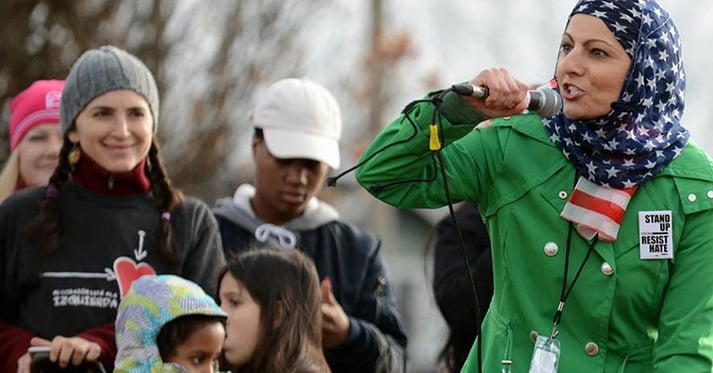
Aneelah Afzali speaks during a Womxn March in Seattle. Photo courtesy Jack Storms.
Aneelah Afzali, BA ’00 (psychology), can’t sing. But when she heard that performers at her grade school talent show would be rewarded with ice cream, a lack of musical talent didn’t stop her from proudly belting out “America the Beautiful” in front of the entire school.
Afzali tells that story from the altar of a church in rural Washington, her hair tucked neatly under a tangerine hijab. Her energy is contagious. Interfaith dialogue is her passion, and she’s in her element. Afzali sees hope at the intersection of Muslim faith and American society. An interfaith leader and activist, she is determined to dispel misconceptions about Islam and Muslims.
Afzali was born in Afghanistan in 1977. Her family lived quiet lives in Kabul, where her mother was a school teacher and her father a soldier and store owner. Just two years after her birth, however, the invasion of Soviet forces disrupted the Afzali’s lives.
Within days, the Soviets seized the cities and highways. Thousands were detained and tortured. Bombs desolated the countryside, leveling entire villages in the pursuit of guerrilla fighters. The Afzalis relocated to Germany, where they lived until 1982, when they immigrated to California before moving to Oregon.
In Portland, the Afzalis owned several video stores, which Aneelah and her five siblings helped their parents run. Her parents often worked multiple jobs as they struggled to put food on the table. College seemed out of reach. However, Afzali received a scholarship from the Daughters of the American Revolution and was able to attend the University of Oregon. Thanks to the scholarship and the sacrifices of her family, she became the first person in her family to attend college.
Growing up, Afzali did not attend mosque regularly. Her mother, a devout Muslim, prayed five times a day, but the other members of the family were ambivalent towards religion. While taking a comparative religions class at the UO, Afzali reconnected with Islam. She concluded it was a revolutionary faith and rededicated herself to it. But as she recalls, she accepted Islam into her mind, not her heart.
After earning her UO degree in psychology, Afzali attended Harvard Law School, graduating in 2003. For the next ten years, Afzali enjoyed a successful career practicing law in Seattle; the Washington State Bar Association granted Afzali its Excellence in Diversity award, and Washington Law and Politics magazine named her a Rising Star.

Afzali, now a resident of Washington, enjoys the great outdoors—including Mount Rainier National Park. Photo courtesy Aneelah Afzali.
In 2013 Afzali underwent a spiritual awakening when she went with her parents went on Hajj, a pilgrimage to the holy city of Mecca that Muslims must undertake once in their lifetime. At last, Islam entered her heart. Afzali left law to focus on community service.
Entering a new phase of life, Afzali faced a rising tide of prejudice. Weeks after Donald Trump was elected, vandals destroyed the sign at Afzali’s mosque. Islamophobic rhetoric may embolden some people to harass and intimidate Arabs or Muslims, or other populations they misidentify as Arab or Muslim. Reported incidents of violence against Muslims, Sikhs, South Asians, Arabs, and Hindus surged 46 percent since 2016. Afzali knew she had to do something.
She founded the American Muslim Empowerment Network (AMEN) with the Muslim Association of Puget Sound (MAPS), and is now its executive director. MAPS-AMEN has three goals: to build coalitions among vulnerable populations; to educate the public on misconceptions surrounding Islam; and to empower and educate youth.
A month after founding MAPS-AMEN, Afzali accompanied Representative Pramila Jayapal (D-Washington) to President Trump's first state of the union address. Afzali wore a stars-and-stripes hijab to the event.
“Aneelah’s story is the American story,” Jayapal said. “A Muslim American woman of color, Aneelah has devoted her life to fighting for justice and equality.”
It’s not an easy mission. Afzali describes Islamophobia as a multi-million-dollar industry, and cites figures from the Center for American Progress that say millions flow from donors to those who aim to influence opinion against Muslims and restrict their freedoms.
Afzali’s activism—like her tour of rural Washington with a Lutheran pastor, where the pair helped listeners discover the commonalities of Christianity and Islam—has brought her numerous accolades. In 2017, Seattle Magazine recognized her as one of the Most Influential People in Seattle. The Faith Action Network honored MAPS with the Interfaith Leadership Award, and the International Rescue Committee honored her with their Humanitarian Leadership Award.
For Afzali, these achievements are milestones in a struggle that will not have an easy ending. On March 15, a mass shooting in Christchurch, New Zealand killed fifty Muslims. The massacre sent shockwaves around the world. The work of activists like Afazali to overcome bigotry and prejudice became more important than ever.
“Violence and evil,” she said, “have no religion.”
- by student writer Abby Keep